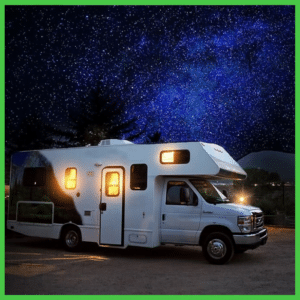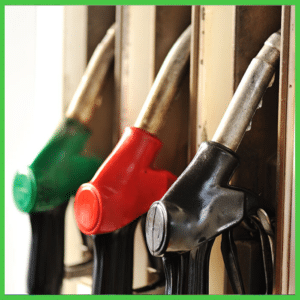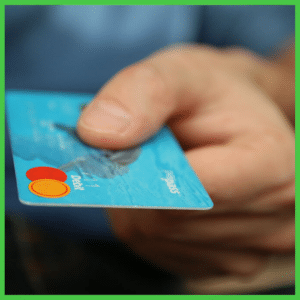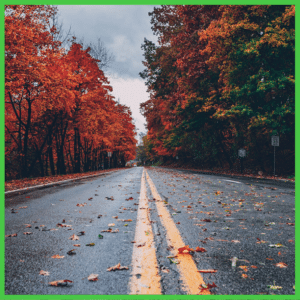Do you dream about hitting the lottery so that you can take that wild, RV road trip you’ve been dreaming about since you were young?
When we gave up the lease on our apartment and moved into a 1999 class A motorhome to travel the country full-time, everyone thought we must have hit the lottery. How else could anyone afford to travel full-time unless they got a huge windfall?
Nope, we didn’t win the lottery. In fact, our decision to move into the RV and travel was the best economic decision we could have made. It turns out that RV living can be as affordable or as expensive as you want it to be. Why? Because you have a lot more freedom and flexibility with your expenses when you’re living in a home on wheels! To help you see how affordable RV travel can be, here are my top 8 money saving travel hacks for RV living.
1. Plan longer stays
It’s probably not surprising that the longer you book a stay at a campground, the better price you get. When it comes to RV parks, the differences can be staggering when you book a week versus when you book a month. For example, we paid $300 for a week in Asheville, North Carolina, while it was $500 for an entire month in St. Augustine, Florida! If you have the time and ability to plan longer stays, you’ll save yourself a ton of money. Besides, planning an extended stay in a single area allows you to really immerse yourself. You’ll be able to meet lots of new people, try out all the local favorites, and not have to spend your days driving, breaking down camp, and setting it back up!
2. Boondocking

If you’re new to the RV world, you might not be familiar with the term “boondocking.” Also called off-grid and dry camping, boondocking is camping in your RV without full-hookups of sewer, water, and electricity. You can find a ton of free camping sites throughout the United States, especially out west. Bureau of Land Management lands offers free-camping with a 14-day maximum before having to move at least 25 miles.
While boondocking is one of the best ways to save money, it does require some specialized equipment and preparation to really be able to camp off-grid in your rig. You’ll need to consider solving for electricity, cooking, as well as ways and tips on managing your freshwater and wastewater tanks. Fortunately, there are a ton of resources out there to get you all the things you need to make your dry-camping experience a success. Look for shows or expos like the Off-Grid Expo, where you’ll find a variety of rigs and additions for your RV to get you in great shape for boondocking!
3. Groceries

When you’re visiting a new place for the first time, and you’re anything like me, you can’t wait to try out the local restaurants and cuisine! I love going out to eat, and it’s one of my guilty pleasures. However, to continue our RV living, we really needed to curb the number of times we eat out.
Fortunately, no matter what kind of RV you have, you’ll have some sort of kitchen. We always go to the local grocery store every week and make sure we have the stuff to make breakfast and lunch, as well as at least four dinners each week. This ensures that we always have food on-hand and that we can eat or pack a lunch if we’re heading out for the day, instead of making an unplanned stop to dine out.
If dining out is your absolute favorite thing to do when you travel, don’t worry. We still go out to eat about once per week, and often split something or grab appetizers instead of having two full meals. That way, I still get my dining out experience, but for much less!
4. Find the cheap gas

Another huge expense that can get out of control if you’re not careful is gas. Traveling in an RV is tons of fun, and you get to see so many new places and meet interesting people wherever you go. However, that mileage can really add up over time, especially if you’re planning an aggressive travel schedule. Gas is often one of the last things you think about when planning your travel budget, but it’s one of the more costly aspects of RVing.
Pretty much every RVer I know uses the GasBuddy app. It’s a crowd-sourced app that helps narrow down the gas stations around you with the lowest fuel cost. It also provides you insights on your fuel usage and the fuel at your location, and even helps you plan out your overall trip for maximum savings on mileage and gas!
5. Credit card with rewards

Many credit card companies have offers for rewards programs to entice customers to sign-up for a card. While some focus on travel and frequent flyer points, some can be beneficial to an RVer. Cards that offer extra cashback percentages for purchasing gas or groceries are perfect. Since these are purchases you’re going to make anyway, you’re saving money by using your card to get the cashback on it.
Additionally, some major gas station and travel center chains, like Flying J, offer their own credit cards. These cards get you consistent savings every time you purchase gas, as well as exclusive rewards and perks like 1/2 off dump station fees or coupons for oil changes. You’re going to make these purchases anyway, so why not make sure that you’re getting the most bang for your buck!
6. Find low-cost & free things to do
While it may be tempting to go to all the amusement parks in Orlando when you take your RV to Florida, that’s not going to be very cost-effective if you’re trying to save money. Instead, look for things that are free or low-cost in the area you’re visiting. Cities often have days when all museums are free and open to the public or free shows and concerts in a public space. These can be fun events to attend when you’re traveling because they not only give you a peek inside the local character, but they’re also much more budget-friendly than a 4-day park hopper pass at Disney!
If you’re traveling near any state or national parks, definitely plan a visit to check them out. Often times, you can find amazing hikes, great fishing, swimming, and boating for little to no money. Just pack a lunch, and take in the new landscapes!
7. Join discount programs for RVers
Just like AAA and AARP, there are a variety of membership discount programs geared explicitly for folks in the RV and camping community. Harvest Hosts provides you with opportunities to camp in private vineyards or farms by hooking you up with the property owners who allow you to camp usually free or for a small donation or purchase from the farm. While that might appeal to boondockers, those that are more interested in staying primarily in campgrounds should look into Passport America. If you want basic amenities and full-hookups wherever you go, Passport America gives you great discounts on-site fees and more than 18,000 partner campgrounds
8. Travel in the off-season

It’s probably no surprise that if you’re traveling somewhere in the off-season, prices are going to be a lot lower. If you can, plan your travel around your destination’s “off-season.” We found that we could get into some higher-end campground resorts, with all the amenities, for a fraction of the peak-season rate when we traveled to Florida in September. We got in right after the super busy summer season ended, and just before the “snowbirds” start arriving, giving us luxury accommodations at an excellent price!
RV living doesn’t have to be expensive. In fact, it can be as cheap as you need it to be to meet your budget, making it an excellent option for folks of all different economic levels. In fact, that’s what led us to this lifestyle. The amount of our fixed monthly cost of living in an apartment was significantly higher than the fixed costs we’d have living in an RV. Why? Because the big-ticket items-like rent- aren’t a factor. Campground fees do apply, but you can adjust that cost based on how much you can boondock, how long you stay places, and if you have a discount membership.
We hope these 8 money saving travel hacks for RV living help you realize that you really can make your travel dreams come true, no matter your budget!
Special Thank you to Kyle with Off Grid Expo for sharing these 8 Money Saving Travel Hacks!

Kyle Doran is a writer and content creator for Off-Grid Expo. Kyle is a Colorado native so he loves getting out into nature. When he’s not writing, he likes to spend his time hiking, mountain biking, and camping in the Rocky Mountains. Currently, his favorite camping spots are Guanella Pass, Estes Park, and Glenwood Springs.
